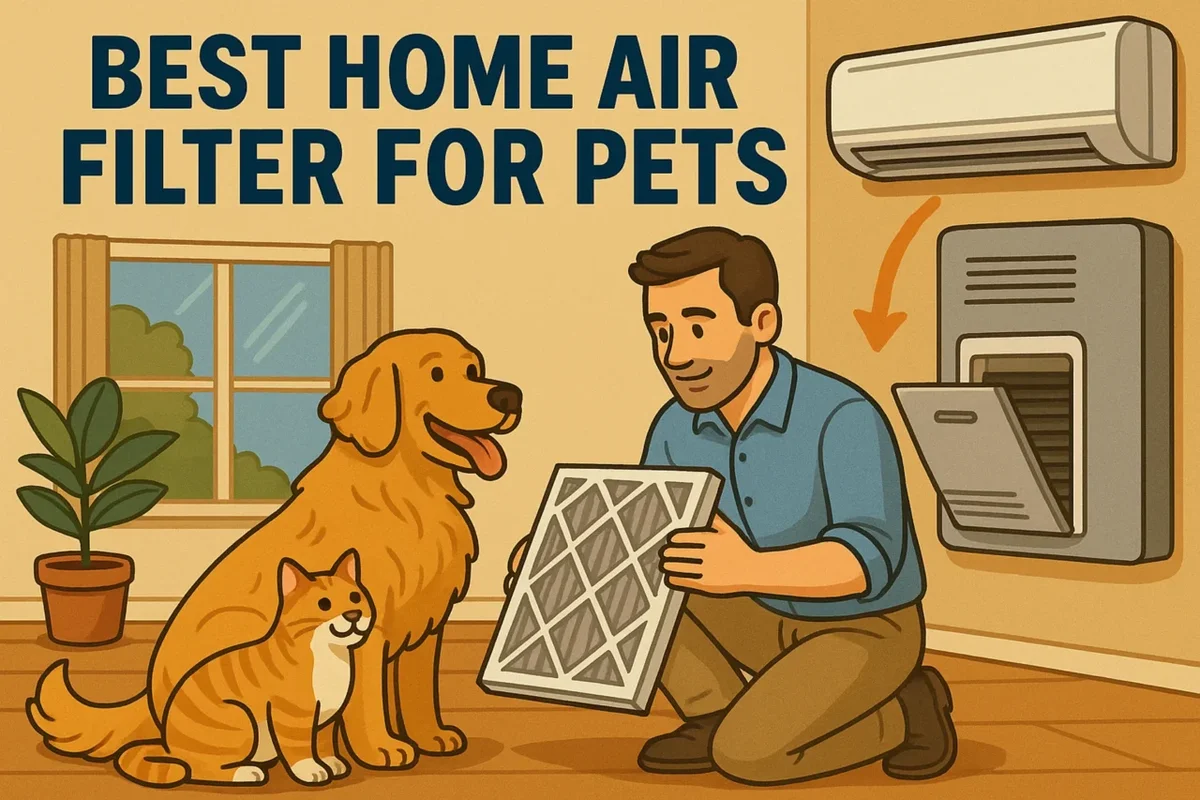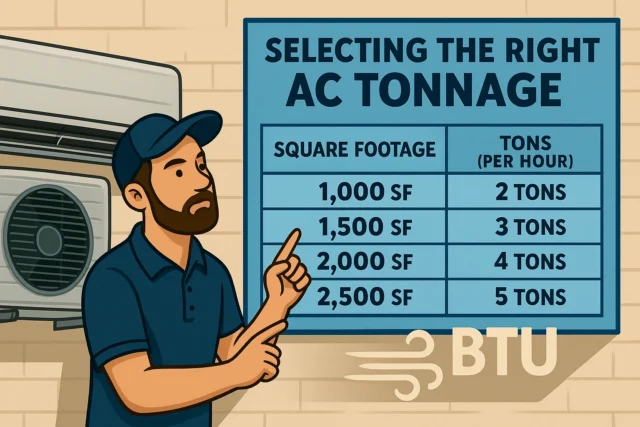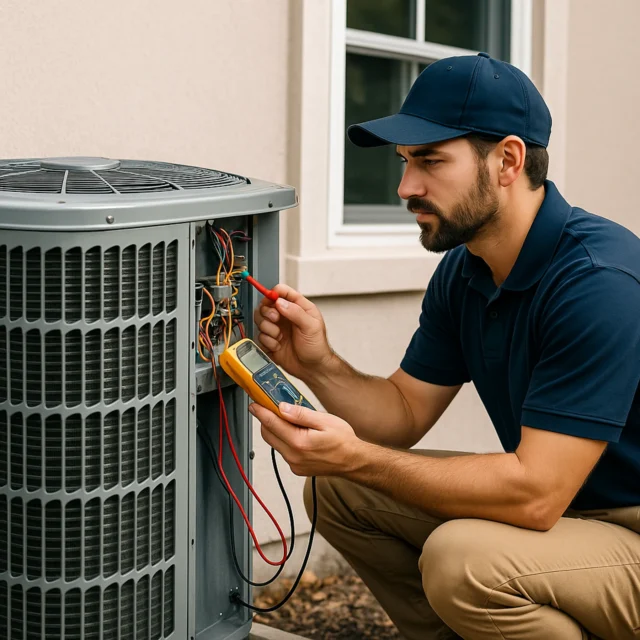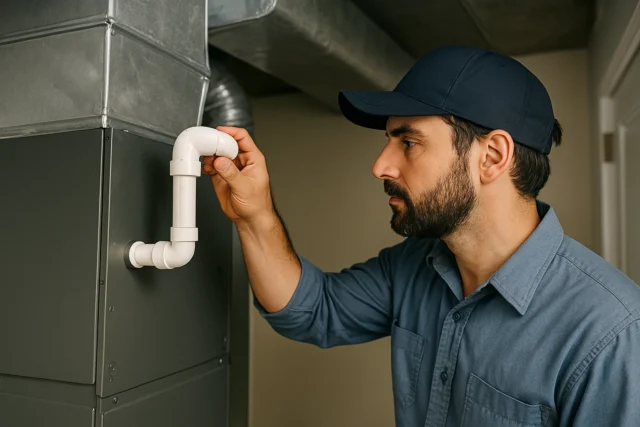The Best Home Air Filter for Pets: Breathe Easier, Live Cleaner

Owning pets brings happiness and companionship, but it also introduces fur, dander, and unwanted odors into your home. While vacuuming and grooming help, they can’t stop these microscopic particles from circulating through your HVAC system. That’s why choosing the best home air filter for pets is a crucial step toward cleaner air, a healthier living environment, and a more efficient air handler system.
For pet owners, the right air filter doesn’t just improve comfort — it directly impacts your home’s air quality, energy efficiency, and even the lifespan of your HVAC system. Let’s explore how the right filter makes all the difference, what types are available, and how you can maintain your air handler for optimal performance.
Why Pet Owners Need Specialized HVAC Filters
Pet dander — tiny flakes of skin shed by cats, dogs, and other furry animals — is one of the leading indoor allergens. These microscopic particles easily enter your home’s air ducts, sticking to furniture, vents, and even your HVAC system’s components.
Regular filters can catch dust and large debris, but they often miss smaller particles like dander, pollen, or microscopic pet hair. Over time, these contaminants build up and restrict airflow, forcing your air handler to work harder. This not only reduces efficiency but can also lead to uneven heating or cooling and higher energy bills.
By installing a filter designed specifically for pet owners, you can reduce these issues significantly. These advanced filters capture more airborne particles, protect your HVAC system from clogging, and help maintain even airflow throughout your home.
How the Right Filter Protects Your Air Handler
Your air handler is the component responsible for circulating conditioned air through your home. When your filter becomes clogged with fur and dust, the air handler has to compensate by pushing harder — a process that increases wear, reduces performance, and consumes more electricity.
By using a high-quality filter, you not only prevent airflow obstruction but also extend the lifespan of your air handler. Clean airflow ensures even temperature distribution and keeps system components — such as coils, motors, and ducts — free from debris.
For long-term reliability, it’s recommended to inspect your air handler and filter every 30–60 days. If you notice restricted airflow, strange noises, or inconsistent temperatures, reach out to A Customer First AC for a professional inspection and maintenance service.
Understanding the MERV Rating: What It Means
Before selecting a filter, it’s important to understand how efficiency is measured. HVAC filters are rated by MERV, or Minimum Efficiency Reporting Value. This scale ranges from 1 to 20, with higher numbers capturing smaller particles.
MERV 1–4: Basic filters; capture only large dust and lint. Not suitable for homes with pets.
MERV 5–8: Mid-range; traps dust, mold spores, and some pet hair. Acceptable for single-pet homes.
MERV 9–12: Superior filtration; removes dander, pollen, and fine dust. Recommended for most pet owners.
MERV 13–16: High-efficiency filters; capture bacteria, smoke, and microscopic allergens. Ideal for allergy sufferers or multi-pet households.
While higher MERV ratings filter better, they can also restrict airflow in older HVAC systems. Consult with an HVAC technician before upgrading to ensure compatibility with your air handler.
Top Types of Air Filters for Homes with Pets
HEPA Filters (High-Efficiency Particulate Air)
HEPA filters are the gold standard in air purification. They trap up to 99.97% of airborne particles as small as 0.3 microns — including pet dander, dust mites, and even bacteria.
These filters are ideal for households with multiple pets or family members who suffer from allergies. However, their density can sometimes restrict airflow in systems not designed for HEPA-grade filtration. In such cases, it’s best to use a hybrid system that balances efficiency and airflow.
Activated Carbon Filters
If odors are your biggest concern, activated carbon filters are an excellent choice. They use a layer of carbon to absorb smells from litter boxes, wet fur, and pet food areas.
While they don’t capture as many particles as HEPA or pleated filters, they excel at neutralizing unpleasant odors, making your home smell cleaner and fresher. Many homeowners combine activated carbon filters with standard pleated filters for the best results.
Pleated MERV Filters
Pleated filters offer a great balance between performance and affordability. Their pleated design increases surface area, allowing them to trap more particles without restricting airflow.
Look for pleated filters rated MERV 11 or higher — these effectively capture pet dander, dust, and fine debris while maintaining strong airflow for your air handler. They also require less frequent replacement than fiberglass filters.
Electrostatic Filters
Electrostatic filters use static electricity to attract and trap particles like hair, dust, and pollen. Many models are washable, making them a cost-effective and eco-friendly choice.
For pet owners, electrostatic filters can significantly reduce airborne hair and help prevent buildup inside your ducts and air handler. They also tend to last longer and require fewer replacements.
Signs You Need to Replace Your Filter
Even the best filter won’t last forever. You should replace your air filter if you notice:
Persistent pet odors, even after cleaning.
Increased dust buildup on furniture and vents.
Allergy symptoms worsening indoors.
Uneven heating or cooling between rooms.
Visible hair or debris on the filter surface.
A clogged filter not only affects air quality but also causes your HVAC system to use more energy, increasing your utility bills. Replacing it on time keeps your home comfortable and your equipment efficient.
Maintenance Tips for Pet Owners
Keeping your air clean is a year-round effort. Here are simple but effective steps to improve indoor air quality and extend the life of your HVAC system:
Replace filters regularly. Every 30–90 days depending on pet shedding and household size.
Vacuum air vents weekly. Pet hair often collects on return vents and reduces airflow.
Groom pets frequently. Brushing your pets minimizes shedding and airborne dander.
Use an air purifier. Combine with a HEPA filter for maximum allergen removal.
Inspect ducts annually. Dander can accumulate inside ductwork, reducing system performance.
For deep cleaning and system checks, schedule professional maintenance with A Customer First AC — your trusted partner in HVAC efficiency and comfort.
The Role of Air Handlers in Cleaner Indoor Air
Your air handler plays a crucial role in keeping your home’s air balanced and clean. It circulates conditioned air, maintaining temperature and humidity. When filters are dirty or clogged, the air handler struggles to maintain efficiency, which can cause uneven comfort levels and poor air circulation.
A clean, well-maintained air handler ensures consistent airflow, stable temperatures, and a healthier indoor environment. Upgrading to advanced filtration or installing a secondary filter system within the air handler can greatly improve air quality, especially in multi-pet homes.
If you’re unsure whether your current system is compatible with high-efficiency filters, schedule a consultation with A Customer First AC to evaluate your setup and recommend upgrades that protect your air handler without reducing performance.
The Connection Between Filters and Energy Efficiency
A clean filter does more than just trap allergens — it helps your HVAC system run more efficiently. When airflow is unobstructed, your system uses less energy to heat or cool your home.
Studies show that replacing dirty filters can reduce your energy consumption by up to 15%. That’s a significant saving over time, especially for homes running HVAC systems daily due to pets or seasonal allergies.
Proper airflow also prevents overheating or freezing of components inside your air handler. In short, investing in better filters saves you money, protects your equipment, and enhances your home’s comfort.
How to Choose the Right Filter for Your Home
When selecting an air filter, consider the following factors:
Number of pets: More pets mean more dander and fur — choose a MERV 11–13 filter.
Allergies: If someone in your home is sensitive to allergens, use HEPA or MERV 13+.
HVAC compatibility: Always check your system manual or ask a technician before upgrading.
Maintenance habits: Washable filters are best for those who prefer long-term use over frequent replacements.
Odor control: Combine activated carbon filters with pleated ones for maximum freshness.
If you’re unsure which type works best for your home, A Customer First AC can guide you toward the most efficient and compatible filtration system.
Additional Tips for Allergy-Free Living with Pets
Beyond using a high-quality air filter, here are extra measures to keep your air cleaner and reduce allergens:
Keep pet beds and blankets washed weekly.
Use a vacuum with HEPA filtration to capture microscopic dander.
Bathe pets with allergy-friendly shampoos that reduce shedding.
Use dehumidifiers during humid months to prevent mold growth.
Keep litter boxes in well-ventilated areas.
These small habits, combined with regular filter maintenance, can drastically improve your indoor air quality and reduce allergy symptoms.
Professional AC and Air Quality Services
While DIY maintenance is essential, professional care ensures your HVAC system stays in top condition. Regular inspections detect early signs of wear, leaks, or inefficiency in your air handler and ductwork.
During a maintenance visit, technicians will:
Inspect and replace filters.
Clean coils and ducts.
Test air pressure and system balance.
Ensure your air handler and blower motor are performing efficiently.
To maintain clean, consistent airflow year-round, schedule service through AC Service by A Customer First AC.
Final Thoughts
Living with pets doesn’t mean compromising on indoor air quality. The best home air filter for pets will capture dander, fur, and odors, ensuring a healthier environment for both you and your animals.
By pairing a high-efficiency filter with regular HVAC maintenance, you’ll not only enjoy cleaner air but also protect your air handler, extend your system’s lifespan, and reduce energy waste.
For expert advice on selecting and installing the right filter for your system, contact A Customer First AC — your reliable partner for superior air quality and home comfort.


